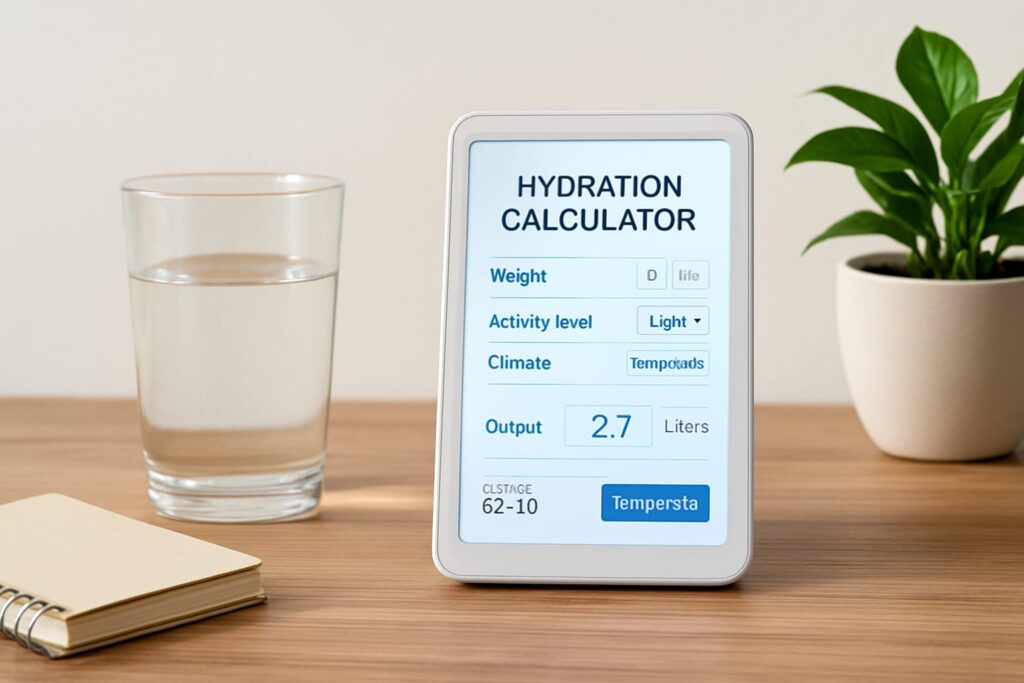Daily Hydration Needs Calculator: Find Your Ideal Intake
Staying hydrated is one of the simplest yet most powerful ways to support overall health. Still, many people wonder exactly how much water they should consume daily. Individual needs vary, depending on weight, activity, diet, and climate. This is where a daily hydration needs calculator becomes extremely helpful.
By using a calculator, you can estimate how much water your body requires to stay balanced, avoid fatigue, and maintain peak performance. In this article, we will explore the science behind hydration, the factors that influence daily needs, and how to apply a daily hydration needs calculator to your lifestyle.

Why Hydration Matters
Water is vital for nearly every process in the human body. This includes regulating temperature, cushioning joints, transporting nutrients, and removing waste. Even mild dehydration may impact energy, mood, and focus. Athletes, in particular, may see endurance and recovery drop if hydration is inadequate.
Transitioning from these health basics, it becomes clear why monitoring daily intake is essential. Using a daily hydration needs calculator provides a personalized guideline instead of relying on the general “eight glasses per day” rule.
Daily Hydration Needs Calculator Explained
A daily hydration needs calculator helps estimate your personal water intake. Rather than relying on guesswork, it considers variables such as:
- Body weight
- Age and gender
- Physical activity level
- Climate and temperature
- Overall health status
By combining these elements, the calculator produces a tailored recommendation. Therefore, you know whether you should aim for two liters, three liters, or more.
Factors That Influence Daily Hydration Needs
Body Weight and Size
People with larger bodies need more water due to greater tissue and fluid volume. Calculators often multiply body weight by a hydration factor to provide a precise estimate.
Activity Level
Exercise dramatically increases fluid requirements. During workouts, the body loses water and electrolytes through sweat. Consequently, athletes may need an additional half-liter to a liter per hour of training, on top of their baseline needs.
Climate and Environment
Living in hot or humid regions accelerates fluid loss, even when you are not exercising. Likewise, high altitudes increase respiration, which leads to more water vapor leaving the body. A daily hydration needs calculator accounts for environmental stress to prevent dehydration.
Diet and Nutrition
Foods with high water content, such as fruits, vegetables, and soups, contribute to hydration. Conversely, caffeine and alcohol may increase fluid loss. By integrating dietary habits, the calculator helps you adjust accordingly.
Health Conditions
Certain conditions, like kidney disease or heart problems, can influence fluid balance. In these cases, medical advice is essential. While a daily hydration needs calculator is useful, it should not replace professional guidance for those with chronic conditions.
Benefits of Using a Daily Hydration Needs Calculator
Calculators provide several important benefits:
- Personalization: Adjusts water intake according to individual needs.
- Accuracy: Goes beyond general recommendations.
- Awareness: Encourages daily attention to hydration.
- Performance support: Offers athletes precise guidance.
- Health promotion: Reduces the likelihood of fatigue, headaches, and kidney stones.
Thanks to these benefits, more and more people are turning to calculators instead of following standardized hydration rules.
How to Use a Daily Hydration Needs Calculator
Step 1: Input Your Weight
Most calculators ask for weight first because it is the foundation of water requirements.
Step 2: Add Activity Level
If you are active, select your typical workout duration and intensity.
Step 3: Include Climate Factors
Some calculators ask if you live in a hot, cold, or high-altitude region.
Step 4: Review Your Daily Intake
The tool then calculates your personalized hydration goal. By comparing it to your current intake, you can adjust and improve.
A reliable daily hydration needs calculator often presents results in both liters and cups, making it easier to apply in daily life.
Hydration Needs Calculator
Estimate your personalized daily water target based on body weight, activity, and environment.
Your Inputs
Total daily target
Practical breakdown
Show formula & tips
Formula: Baseline = weight(kg) × baseline factor (30–40 ml/kg). Exercise add‑on per hour: Light ≈ 0.3 L, Moderate ≈ 0.7 L, Vigorous ≈ 1.0 L. Environment add‑on: Hot/Humid +0.5 L, Cold +0.2 L, High Altitude +0.5 L. Special add‑ons: Pregnancy +0.3 L, Breastfeeding +0.7 L.
These are general wellness estimates for healthy adults. Always follow your clinician’s advice if you have medical conditions requiring fluid restriction or specific guidance.
Signs You Need More Water
Even with a calculator, listening to your body is important. Common signs of dehydration include:
- Persistent thirst
- Dark yellow urine
- Fatigue and dizziness
- Dry mouth or lips
- Reduced concentration
Transitioning from these warning signs to prevention, it becomes clear that tracking intake daily is a wise habit.
Practical Tips to Stay Hydrated
- Start your morning with water: Drinking a glass immediately after waking helps kickstart metabolism.
- Carry a reusable bottle: Keeping water nearby encourages consistent sipping.
- Set reminders: Phone alarms or hydration apps ensure you never forget.
- Add flavor naturally: Infuse water with lemon, cucumber, or berries to make it enjoyable.
- Balance with electrolytes: During intense exercise, add sodium and potassium for proper fluid absorption.
By applying these practices alongside a daily hydration needs calculator, you create a sustainable hydration routine.
Debunking Common Hydration Myths
1: Everyone Needs Eight Glasses
This traditional rule is too general. A daily hydration needs calculator proves that requirements vary widely.
2: Coffee and Tea Dehydrate You
While caffeine has a mild diuretic effect, moderate amounts of coffee or tea still contribute to hydration.
3: Only Athletes Need to Track Water
Hydration affects everyone, not just athletes. Even office workers benefit from using a daily hydration needs calculator.
4: Clear Urine Means Perfect Hydration
Urine color can be influenced by diet and supplements. Although pale yellow is ideal, calculators provide more reliable numbers.
The Science Behind Hydration
Water makes up about 60% of adult body weight. The kidneys and brain regulate balance through a sophisticated system involving hormones such as vasopressin. When water levels drop, the body triggers thirst and conserves fluids. However, thirst often appears after mild dehydration has already set in.
Because of this, relying solely on thirst is insufficient. A daily hydration needs calculator helps prevent the early stages of dehydration before they affect performance or mood.
Daily Hydration Needs Calculator for Different Lifestyles
For Athletes
Athletes should measure sweat loss during training sessions. A daily hydration needs calculator can then adjust recommendations accordingly.
For Office Workers
Sedentary workers still require regular hydration. Long hours at a desk often lead to unnoticed dehydration. Using a calculator provides a reminder to drink consistently.
For Older Adults
As people age, the sense of thirst weakens. This makes tools like a daily hydration needs calculator particularly valuable for preventing complications.
For Children
Children’s needs differ depending on age and activity. Parents can use calculators to ensure kids drink enough without forcing excessive amounts.
Long-Term Health Benefits of Proper Hydration
- Kidney Health: Adequate water reduces the risk of stones.
- Digestive Comfort: It prevents constipation.
- Cognitive Clarity: Proper hydration improves focus and memory.
- Weight Management: Drinking water before meals can reduce appetite.
- Joint Support: Water cushions cartilage and prevents stiffness.
These benefits underline why a daily hydration needs calculator is not just a tool but a health strategy.
Daily Hydration Needs Calculator vs. Manual Tracking
Some people track hydration manually with journals or mobile apps. While helpful, these methods lack personalization. A daily hydration needs calculator adapts to changes in weight, environment, and activity, offering a more dynamic approach.
How Technology Enhances Hydration Tracking
Wearable devices and smart bottles can now sync with hydration apps. Many of these tools automatically adjust your daily water goals in real time. This integration makes staying hydrated simple and convenient.
Potential Risks of Overhydration
While dehydration occurs more frequently, excessive water intake can also cause problems, particularly if electrolytes aren’t replenished. Signs of overhydration include nausea, confusion, and swelling. Maintaining a balanced approach is essential, and using tailored tracking strategies helps prevent extremes.
Conclusion
Proper hydration is a foundation of health, energy, and overall well-being. However, the amount of water you need is not the same for everyone. Personalized guidance helps you find the right balance based on your body, environment, and activity level.
Shifting from guesswork to tailored recommendations makes hydration more effective. Whether you are an athlete, an office worker, or simply someone who wants to feel your best each day, modern tools can provide the clarity and direction you need.
Ultimately, water is life, and knowing how much your body truly requires ensures you stay at your best.
